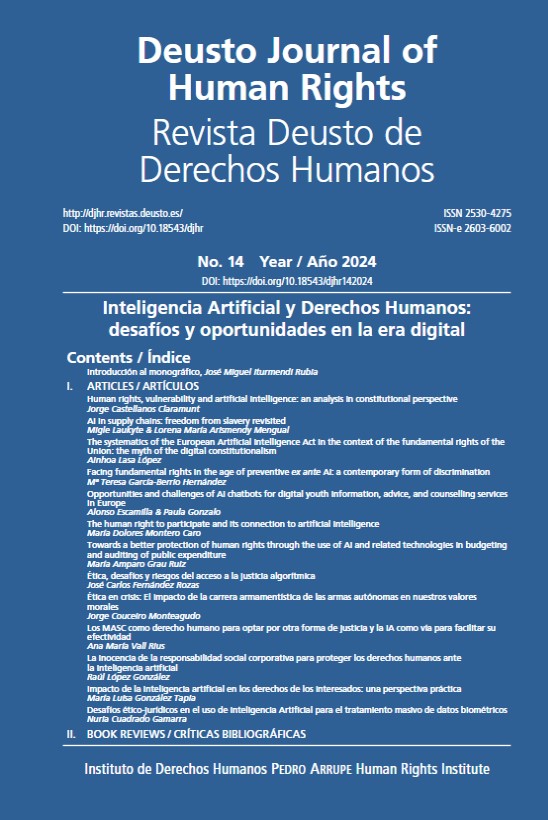Ethics in crisis: The impact of the autonomous arms race on our moral values
Abstract
Systematic killings have been part of the darkest episodes in history. Today, they are presented as a goal in warfare, especially with military AI and autonomous weapons. Proponents claim that these weapons will surpass humans in military capability and morale, offering more precise and emotionless violence. However, we argue that these weapons replicate and intensify the moral challenges of the past. Autonomous violence morally devalues victims and reduces the moral responsibility of attackers, jeopardising restrictions on the use of military force.
Received: 31 May 2024
Accepted: 25 September 2024
Downloads
References
Altmann, Jürgen y Frank Sauer. 2017. «Autonomous weapon systems and strategic stability». Survival 59 (5): 117-142.
Anders, Günther. 1962. Burning conscience. Nueva York: Monthly Review Press.
Ansorge, Josef T. 2016. Identify and sort: How digital power changed world politics. Oxford: Oxford University Press.
Arendt, Hannah. 2018. The origins of totalitarianism. Galway: Penguin.
Asaro, Peter. 2012. «On banning autonomous weapon systems: human rights, automation, and the dehumanization of lethal decision-making». International Review of the Red Cross 94 (886): 687–709. https://doi.org/10.1017/S1816383112000768.
BBC News. 2013. US Drone Programme: ‘Strict, fair and accountable’ - Kerry. Acceso el 28 de mayo de 2024. https://www.bbc.com/news/av/world-radio-and-tv-22690918/us-droneprogramme-strict-fair-and-accountable-kerry.
Best, Geoffrey Francis Andrew. 1980. Humanity in warfare. The modern history of the international law of armed conflicts. Oxford: Routledge.
Bode, Ingvild y Thomas Watts. 2021. Meaning-less human control: Lessons from air defence systems on meaningful human control for the debate on AWS. Odense: University of Hertfordshire.
CBS News. 2020. Barack Obama: The 2020 60 minutes interview. Acceso el 16 de noviembre de 2023. https://www.cbsnews.com/video/barack-obama-60-minutes-2020-11-15.
Cheney-Lippold, John. 2019. «Accidents happen». Deleted Journal 86 (2): 513-35.
Congressional Research Service. 2022. «Defense Primer: command and control», In Focus, actualizado el 14 de Noviembre.
Corbett, Julian. 2008. Some principles of maritime strategy. Milton Park: Routledge.
Crootof, Rebecca. 2019. «Regulating new weapons technology». En The impact of emerging technologies in the Law of armed conflict, editado por Ronald T.P. Alcala y Eric Talbot, 3-36. Oxford: Oxford University Press eBooks. https://doi.org/10.1093/oso/9780190915322.003.0001.
Cummings, Mary. 2004. «Automation bias in intelligent time critical decision support systems». American Institute of Aeronautics and Astronautics, junio. https://doi.org/10.2514/6.2004-6313.
Ekelhof, Merel. 2019. «Moving beyond semantics on autonomous weapons: Meaningful human control in operation». Global Policy 10 (3): 343-48. https://doi.org/10.1111/1758-5899.12665.
Emery, John R. 2016. «Review: Anthony F. Lang Jr., Cian o’Driscoll y John Williams, eds. Just War: Authority, Tradition, and Practice». European Review of International Studies 3 (1): 143-47. https://doi.org/10.3224/eris.v3i1.26023.
Freedman, Lawrence. 2017. The future of war: A history. Londres: Allen Lane.
Glover, Jonathan. 2000. Humanity: A moral history of the Twentieth Century. Londres: Yale University Press. http://ci.nii.ac.jp/ncid/BA44910039.
Heyns, Christof. 2017. «Autonomous weapons in armed conflict and the right to a dignified life: an African perspective». South African Journal of Human Rights 33 (1): 46–71. https://doi.org/10.1080/02587203.2017.1303903.
Keegan, John. 1994. A history of warfare. Londres: Pimlico.
Kelman, Herbert G. 1973. «Violence without moral restraint: Reflections on the dehumanization of victims and victimizers». Journal of Social Issues 29 (4): 25-61. https://doi.org/10.1111/j.1540-4560.1973.tb00102.x.
Knight, Will. 2021. «The Pentagon inches toward letting AI control weapons». WIRED. Acceso el 10 de mayo de 2023. https://www.wired.com/story/pentagon-inches-toward-letting-ai-control-weapons/.
LeMoncheck, Linda. 1985. Dehumanizing women: Treating persons as sex objects. Londres; Rowman & Allanheld.
Lifton, Robert J. 2016. «The genocidal mentality». Tikkun 31 (3): 32-33. https://doi.org/10.1215/08879982-3628248.
Marchant, Gary E., Braden R. Allenby, y Joseph R. Herkert. 2011. The growing gap between emerging technologies and legal-ethical oversight: The pacing problem. Dordrecht: Springer.
Mitchell, Melanie. 2019. Artificial Intelligence: A guide for thinking humans. Nueva York: Farrar, Straus y Giroux.
Münkler, Herfried. 2004. Die neuen kriege. Hamburgo: Rowohlt. http://ci.nii.ac.jp/ncid/BB06266147.
Nussbaum, Martha C. 1995. «Objectification». Philosophy and Public Affairs 24 (4): 249-91. https://doi.org/10.1111/j.1088-4963.1995.tb00032.x.
Pakenham, Thomas. 1979. The Boer war. Barcelona: Futura Book. http://ci.nii.ac.jp/ncid/BA86489462.
Payne, Kenneth. 2021. The dawn of artificially intelligent conflict. Londres: Hurst Publishers.
Phillips-Levine, Trevor, Michael Kanaan, Dylan Phillips-Levine, Walter D. Mills y Noah Spataro. 2022. «Weak human, strong force: applying advanced chess to military AI». War on the Rocks. Acceso el 7 de julio de 2023. https://warontherocks.com/2022/07/weak-human-strong-force-applying-advanced-chess-to-military-ai.
Pilkington, Ed. 2017. «Life as a drone operator: ‘Ever step on ants and never give it another thought?’» The Guardian, 14 de julio. Acceso el 4 de julio de 2024. https://www.theguardian.com/world/2015/nov/18/life-as-a-drone-pilot-creech-air-force-base-nevada.
Riesen, Erich. 2022. «The moral case for the development and use of autonomous weapon systems». Journal of Military Ethics 21 (2): 132-50. https://doi.org/10.1080/15027570.2022.2124022.
Scahill, Jeremy. 2015. «Leaked military documents expose the inner workings of Obama’s drone wars». The Intercept. 21 de octubre. Acceso el 21 de octubre de 2024. https://www.theintercept.com/drone-papers/the-assassination-complex.
Scharre, Paul. 2018. Army of none: Autonomous weapons and the future of war. Nueva York: W. W. Norton & Company.
Schultz, Timothy P. 2021. Remote warfare: A new architecture of air power. C amb r i d g e : Cambridge University Press. https://doi.org/10.1017/9781108985024.003.
Schwarz, Elke. 2021. «Autonomous weapons systems, artificial intelligence, and the problem of meaningful human control». Philosophical Journal of Conflict and Violence 5 (1): 53-72. https://doi.org/10.22618/tp.pjcv.20215.1.139004.
Singer, P. W. 2009. Wired for war: The robotics revolution and conflict in the 21st century. Nueva York: Penguin Books.
Umbrello, Steven, Phil Torres, y Angelo F. de Bellis. 2019. «The future of war: could lethal autonomous weapons make conflict more ethical?». AI & Society 35 (1): 273-82. https://doi.org/10.1007/s00146-019-00879-x.
Walker, Paddy. 2021. «Leadership challenges from the deployment of lethal autonomous weapon systems: How erosion of human supervision over lethal engagement will impact how commanders exercise leadership». The RUSI Journal 166 (1): 10–21. https://doi.org/10.1080/03071847.2021.1915702.
Williams, John. 2021. «Locating LAWS: Lethal autonomous weapons, epistemic space, and ‘meaningful human’ control». Journal of Global Security Studies 6 (4): 1-18. https://doi.org/10.1093/jogss/ogab015.
Deusto Journal of Human Rights / Revista Deusto de Derechos Humanos is an Open Access journal; which means that it is free for full and immediate access, reading, search, download, distribution, and reuse in any medium only for non-commercial purposes and in accordance with any applicable copyright legislation, without prior permission from the copyright holder (University of Deusto) or the author; provided the original work and publication source are properly cited (Issue number, year, pages and DOI if applicable) and any changes to the original are clearly indicated. Any other use of its content in any medium or format, now known or developed in the future, requires prior written permission of the copyright holder.



3.jpg)
3.jpg)
3.jpg)
.jpg)








